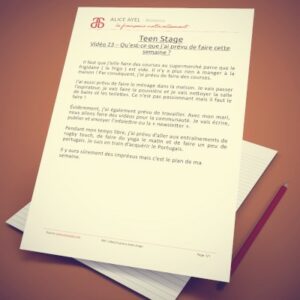Coucou les French learners,
I hope you are enjoying l’été, summer time! I love this time of the year because as some of you may know already, I am a frileuse. This French word cannot really be translated in English but it basically means I am sensitive to cold. Summer is the only time of the year when I am not cold!
Est-ce que tu es frileux ou frileuse ? Are you also the type of person who feels cold all the time?

At the swimming pool, there are those who dive, and there’s me. The first one who splashes me, I drown them.
Terri who is very dear member started the Teen Stage and she wrote to me:
I have just started the Teen Stage on your membership. I am enjoying it. First, I write my answer to your question in my own “French” and then check with my new friend, ChatGPT. Mdr – morte de rire (laugh out loud). I like to see how close I am to getting it correct. It is about 50/50. But I am not discouraged. I actually am thrilled when I express it correctly. It is not just vocabulary. It is also learning how to think in French rather than in English because there are differences in expressing thoughts, as you well know. Par exemple, my daughter has 10 years vs my daughter is 10 years old. It must be so nice not to have to say “old” after expressing someone’s age. What I mean is that it is just an extra word to always have to say In English. Well, that was off point!
Yes, it is indeed very nice not to have to say vieux, old at the end of someone’s age. Morte de rire !
Read more about how the Teen Stage works.

Try out the first session of the Teen Stage for free. This stage is designed for French advanced beginners. You understand the most frequent words and structures and you are ready to understand and answer questions about yourself.
Comprehensible input is crucial to acquire French #inputaloneissufficient
But then comes the time when you are ready to output. Speaking and writing are two forms of output.
Writing before speaking has several benefits for language learners. Writing serves as the silent key to unlock confident speaking. While writing and speaking may seem distinct, their connection is both intricate and impactful.
Delve into the ways in which the act of the act of writing nurtures language proficiency, fosters vocabulary growth, and cultivates a deep understanding of linguistic structures.
Time to think French
Thinking in another language and in this case, thinking in French is the very first step to start outputting. When you understand most French content, your brain subconsciouly absorbs the French language and then you naturally start to think French.
Writing allows you to organize your thoughts more deliberately. When you write, you have the time to think about sentence structures, vocabulary, and ideas without the pressure of immediate conversation.
This practice helps you become more comfortable with constructing sentences correctly, which can then transfer to your spoken language.
Writing also gives you the opportunity to expand your vocabulary. As you search for the right words and expressions while writing, you’re likely to encounter new vocabulary and phrases. This expanded vocabulary will naturally become part of your spoken language as well.
Confidence building
Starting with writing can boost your confidence. As you become more comfortable with constructing sentences accurately in writing, you’ll gain the confidence to use these sentences when speaking. This gradual progression builds a strong foundation for spoken language.
When you write, you can review and revise your work. This reflective process helps you identify areas for improvement, and as you correct your writing, you’ll internalize the correct language structures and patterns.

If you don’t know what to write about yet start by copying a story you enjoyed like this fun tale from Tunisia (it is free!). First listen and read it. Then copy it or when you feel confident enough, write a summary. Little by little, you will start to write French on your own and you will feel amazing!
Practice time
Writing offers you the luxury of time. You can take your time to choose the right words, structure your sentences, and review your work. This extended practice indirectly improves your language processing speed, benefiting your spoken communication.
You can start writing or journaling in French at any point in your language learning journey. But the key (as always) is to enjoy it! (If you don’t enjoy writing, don’t do it. Language acquisition happens when you understand what you hear and/or read).
If you’re a beginner, writing simple sentences, short paragraphs, or even jotting down vocabulary can help solidify basic language structures and vocabulary. As you progress, your writing can become more complex and reflective, allowing you to practice advanced grammar and express nuanced thoughts.
Writing serves as a personal record of your linguistic growth over time. So, don’t hesitate to pick up that pen! Embrace the challenge and view it as an opportunity to learn and grow. With time, you’ll find that your ability to express yourself in simple ways will significantly improve, enabling you to gradually tackle more complex topics in your writing.
#trustheprocess
What are you waiting for? Join us now and make real progress in French! You will gain:
CLARITY: progress step by step through stages and make French become clear to you.
COMMUNITY: meet weekly and keep yourself accountable through the most caring and invested community.
TRANSFORMATION: feel empowered. Be fluent in French. Transform yourself and get a new soul.
P.S. Got friends, family, colleagues and clients who want to become fluent in French? Share this with them, they’ll thank you for it!


